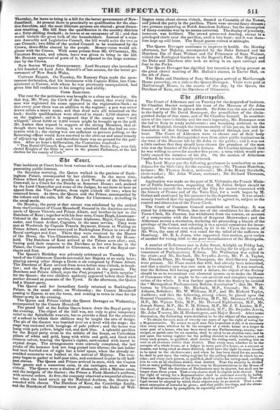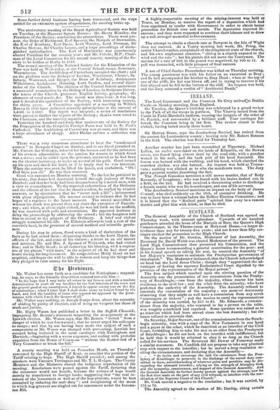Zbe „Metropolis.
The Court of Aldermen met on Tuesday for the despatch of business. Sir Claudius Hunter resigned his trust of the Museum of Sir John Soane; of whose life he gave a sketch. Sir John was the son of a nurse in the family of Mr. David Bosanquet, the grandfather of the distin- guished Judge of that name, and of Sir Claudius himself. In sonsider- ation of the nurse's fidelity and the son's ingenuity, Mr. Bosanquet sent the lad to Italy to study architecture ; and becoming architect to the Bank of England, through the instrumentality of his patron, he laid the foundation of that fortune which he acquired through care and la- bour. The Court of Aldermen were to choose one of their body to associate with the distinguished men from other public institutions in the trust of the Museum left by Sir John to the public ; and it was not a little curious that they should have chosen the grandson of the man who was the founder of Sir John's fortune. Sir Claudius intimated that he was willing to serve for another five years ; a term which would pro- bably exceed the duration of his life. On the motion of Alderman Copeland, he was unanimously reelected.
The Lord Mayor put the following gentlemen in nomination as can- didates for the Shrievalty for the ensuing year—Mr. Thomas Hamilton, lorimer ; Mr. Thomas Stokes, scrivener; Mr. John Henry Burchells, cloth-worker ; Mr. John Walter, stationer; Mr. Richard Thornton, leather- seller.
Application was made on the part of M. Villemain, the French Minis- ter of Public Instruction, requesting that M. Julius Delpet should be permitted to consult the records of the City for matter connected with the history of France and of the Teirs Etat, for a work begun by M. Guizot and continued by his successor in the department. It was unani- mously resolved that the application should be agreed to, subject to the control and discretion of the Town-Clerk.
The Court of Common Council assembled on Thursday. It was stated by Alderman Wilson, that one of the candidates for the office of Town-Clerk, Mr. Pearson, has withdrawn from the contest, on account of a compromise with the friends of Sergeant Merewether ; and the Alderman moved &resolution, declaring the proceeding a breach of the privilege of the Court, and referring it to a special committee for inves- tigation. The motion was adopted, by 61 to 49. • Upon the motion of Mr. Wire, the sum of 500/. was voted for the relief of the sufferers in Hamburg. Mr. R. L. Jones, who supported that motion, gave notice of another for voting 5004 to the poor manufacturers of the Metropolis.
A number of Reformers met in John Street, Adelphi, on Friday last, to determine on the formation of a Society having for its object the ad- vancement of Parliamentary Reform. Mr. Warburton was called to the chair ; and Mr. Roebuck, Mr. Swynfen Jervis, Mr. P. A. Tay lor, Mr. Francis Place, Mr. George Thompson, the Anti-Slavery lecturer, were present. Mr. Place stated that 400/. had already been subscribed, and that a similar sum was sure soon to be obtained. It was resolved, that the Reform Bill having proved a failure, the object of the Society should be so to reconstruct our electoral system as to make the House of Commons what it ought to be—an accurate and complete represen- tation of the whole. It was further agreed that the Society be entitled the "Metropolitan Parliamentary Reform Association": that Mr. War- burton be Chairman ; Mr. Roebuck, M.P., Counsel ; Mr. W. H. Ashurst, Solicitor ; Mr. W. Williams, M.P., and Mr. Richard Taylor, Auditors ; and that the following, among others, be placed upon the General Committee, viz. Dr. Bowring, M.P., Mr. Sharman Crawford, Mr. Wynne Ellis, M.P., Mr. Howard Elphinstone, M.P., Mr.. Joseph Hume, M.P., Mr. T. N. Gibson, M.P. Mr. J. T. Leader, M.P., the Earl of Radnor, Messrs. J. Scholefield, /4.P., Mr. Swynfen Jervis, Mr. John Travers, Mr. H. Hetherington, and Major Revell. After some discussion, the following were declared to be the object of the society- " To obtain for each man of twenty-one years of age the right of voting for a Representative. To secure to each man this important ri.2ht, it is necessary that every man' whether be be the occupier of a whole house or a lodger in some part of ahouse, who has been rated to any Parliamentary, county, mess uicipal, or parish-rate for six months, shall be rated to an election-rate, and be put upon the voting register for the polling.district in which be resides; and every such person, so qualified, shall receive his voting-card, entitling him to vote at all elections within that district. That every man, whether he be the occupier of a whole house, or a lodger in some part of a house, or a servant or inmate, not being rated as above directed, shall have the right to cause himself tabs rated to the elettion-rate; and when he has been rated for six months, he shall be put upon the voting-register for the polling-district in which he re- sides; and every such person, so qualified, shall receive his voting-card, entitling him to vote at all elections within that district. That the country be divided into as many polling-districts as there may be Representatives in the House of Commons. That the duration of Parliaments may be shorter, but shall not be longer than three years. That every elector shall be eligible to be elected. That
the right of voting for a Representative shall be exercised secretly by ballot. That each Representative of the People shall be paid for his services. That all legal means he adopted by which these objects may be promoted. That a con- stant succession of lectures be given ; and that public meetings, and the circu- lation of information by pamphlets, be especially attended to."
Some further detail business having been transacted, and the steps settled for an extensive system of operations, the meeting broke up.
The anniversary meeting of the Royal Agricultural Society was held on Tuesday, at the Hanover Square Rooms ; Mr. Henry Handley, the President of the Society, conducting the proceedings. There were pre- sent, the Duke of Richmond, Earl Spencer, the Marquis of Downshire, the Earl of Rosebery, Earl Dude, Lord Worsley, Lord Portman, Sir Charles Morgan, Sir Charles Lemon, and a large assemblage of distin- guished agriculturists. The Earl of Hardsvicke was unanimously elected President for the ensuing year ; and Mr. Colvile, M.P., Chair- xnan of the Local Committee for the annual country meeting of the So- ciety to be holden at Derby in 1843.
The annual meeting of the National Society for the Education of the Poor was held on Wednesday, at the Central School-rooms, Sanctuary, Westminster. The Archbishop of Canterbury occupied the chair ; and on the platform were the Bishops of London, Winchester, Chester, Sa- lisbury, Worcester, and Bangor, the Dean of Salisbury, Archdeacon Wilberforce, Archdeacon Manning, Lord Sandon, and several digni- taries of the Church. The children of the Central School underwent a successful examination by the Bishop of London, in Scripture history, the tenets of the Church, grammar, English history, geography, the elements of vocal music, &c. The report was then read : it was long, and it detailed the operations of the Society, with increasing success, for thirty years. A Committee appointed at a meeting in Willis's _Rooms in 1839 have collected annually subscriptions to the amount of 1,4001. to 6,0001. The report was adopted ; a series of resolutions were passed to further the objects of the Society ; thanks were voted to the Chairman, and the meeting separated.
Yesterday the hundred-and-forty-first anniversary of the Society for the Propagation of the Gospel in Foreign Parts was held in St. Paul's Cathedral. The Archbishop of Canterbury was present, and there was a large attendance of clergy. After Divine service a collection was made.
There was a very numerous attendance to hear the "condemned sermon" in Newgate Chapel on Sunday, and to see Good preached at. Mr. Carver, the Ordinary, selected for the lessons and for the substance of his sermon admonitions on the passion for women to which Good was a slave; and he called upon the prisoner, convicted as he had been on the clearest testimony, to make an avowal of his guilt. Good turned zip his eyes and shook his head, as if to imply that he was innocent. When the service was over, he lifted his hands, and exclaimed, " Oh ! God bless you all." He was then removed.
Good was executed on Monday morning. To the last he persisted in his story, that Jones had destroyed herself through jealousy of Susan Butcher; and that her body had been dismembered by a match-man, with a view to concealment. To the repeated exhortations of the Ordinary and the officers of the law that he should confess, he replied by evasive answers, or by ejaculations that tie "never took a life"; interspersed with pious objurgations. His manner seemed to indicate that he had hopes of a reprieve to the latest moment. The crowd assembled to witness his death was greater than any since the execution of Fauntle- roy ; and when, at about eight o'clock, he was led forth on the scaffold, he was received with yells and execrations. He appeared desirous to delay the proceedings by addressing the crowd ; but the hangman told him to attend to the prayers of the Ordinary. A brief and violent struggle terminated his life. Dr. Elliotson aftewards took a cast of the convict's head, in the presence of several medical and scientific gentle- men.
During his stay in prison, Good wrote a kind of declaration of the facts as he had stated them ; dispensing thanks to the Lord Mayor, the officers of the law, and some of his visiters ; a letter to an old master and mistress, Mr. and Mrs. J. Spencer of Walworth, who had visited him ; and to Molly Good ; in all bestowing his blessing, with a copious use of the phrase "with tears," as the adjunct of all he had done and heard during his imprisonment. He congratulates Molly Good on her acquittal, and hopes she will be able to redeem and keep the things that they pledged to raise money for his flight.



























 Previous page
Previous page